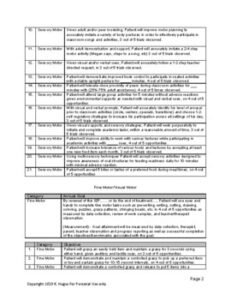Muscle tension can be a real pain, quite literally. Whether it’s caused by stress, overexertion, or an injury, that tightness in your muscles can leave you feeling sore and uncomfortable. But what if there was a natural solution that could provide you with the relief you need? Look no further than the most powerful natural muscle relaxer. In this article, we will explore the incredible benefits of this miracle substance and how it can help you find the relaxation you’ve been longing for. So sit back, relax, and get ready to discover a game-changer in muscle relaxation.

Understanding Muscle Relaxers
Muscle relaxers are medications that are commonly prescribed to help relieve muscle pain, spasms, and tightness. They work by targeting the central nervous system to suppress muscle contractions and promote relaxation. Muscle relaxers are often used in conjunction with other treatments, such as physical therapy and rest, to help alleviate muscle-related discomfort. While there are various types of muscle relaxers available, they can be broadly categorized into two groups: natural and synthetic muscle relaxers.
Types of muscle relaxers
Muscle relaxers can be classified into two main types: natural and synthetic. Natural muscle relaxers, as the name suggests, are derived from natural sources such as plants and herbs. These remedies have been used for centuries in traditional medicine practices and are believed to have fewer side effects compared to their synthetic counterparts. On the other hand, synthetic muscle relaxers are developed in laboratories and usually require a prescription from a healthcare professional. They are typically stronger and faster-acting than natural alternatives, but they also come with a higher risk of adverse effects.
Natural vs. synthetic muscle relaxers
When considering muscle relaxers, you may wonder whether natural or synthetic options are more suitable for your needs. Natural muscle relaxers offer several advantages over synthetic ones. Firstly, they tend to have fewer side effects, making them a safer choice for long-term use. Natural alternatives also provide a more holistic approach to muscle relaxation, addressing underlying causes such as inflammation and promoting overall wellness. However, synthetic muscle relaxers may be more potent and may be necessary for severe or chronic conditions where natural remedies may not be sufficient. It’s important to consult with a healthcare professional to determine the most appropriate option for your specific situation.
Introduction to the Most Powerful Natural Muscle Relaxer
What is the most powerful natural muscle relaxer?
One of the most powerful natural muscle relaxers is magnesium. Magnesium is an essential mineral that plays a crucial role in muscle function and relaxation. It acts as a natural calcium channel blocker, preventing excessive calcium from entering muscle cells and causing them to contract. By promoting a healthy balance of calcium and magnesium in the body, muscle tension and spasms can be effectively reduced.
How does it work?
Magnesium works by interacting with receptors in the brain and nervous system that regulate muscle contraction. It enhances the effects of gamma-aminobutyric acid (GABA), a neurotransmitter that inhibits nerve activity. By increasing GABA levels, magnesium aids in calming the nervous system, reducing muscle tension, and promoting relaxation.
Benefits of using natural muscle relaxers
Using natural muscle relaxers like magnesium offers a range of benefits. Firstly, it provides a safe and natural alternative to synthetic medications, minimizing the risk of adverse side effects. Natural muscle relaxers also tend to have a milder effect, allowing for gentle and gradual muscle relaxation without excessive drowsiness or impairment. Additionally, natural remedies often come with other health benefits, such as aiding in sleep, reducing anxiety, and improving overall well-being.
Relieving Muscle Tension and Spasms
How muscle relaxers alleviate tension
Muscle relaxers, including natural options, alleviate muscle tension by targeting the underlying causes. They work to inhibit excessive nerve activity, reduce inflammation, and increase blood flow to the affected muscles. By addressing these factors, muscle relaxers help to relax tight muscles and relieve associated discomfort.
Natural remedies for muscle spasms
In addition to magnesium, several other natural remedies can effectively alleviate muscle spasms. These include:
-
Chamomile: Chamomile has relaxing properties that can help reduce muscle spasms and tension. It can be consumed as a tea or used topically in the form of essential oil.
-
Valerian root: Valerian root is known for its calming effects and can help relax muscles. It is commonly consumed as a herbal supplement or tea.
-
Passionflower: Passionflower is a natural sedative that can relieve muscle spasms and promote relaxation. It can be consumed as a tea or taken as a supplement.
Comparing natural muscle relaxers to medications
While natural muscle relaxers can provide relief for muscle tension and spasms, it’s important to note that they may not be as potent as medications. Synthetic muscle relaxers prescribed by a healthcare professional may be necessary for severe cases or when immediate relief is required. It’s essential to consult with a healthcare professional to determine the most appropriate treatment option based on the severity and underlying cause of your muscle spasms.
Reducing Muscle Pain and Inflammation
The role of natural muscle relaxers in pain management
Natural muscle relaxers can play a significant role in managing muscle pain by addressing the underlying causes. They help relax tense muscles, reduce inflammation, and promote blood flow to the affected area. By targeting these factors, natural muscle relaxers provide natural pain relief without the potential side effects associated with synthetic medications.
Using natural ingredients to reduce inflammation
Inflammation is a common cause of muscle pain. Some natural ingredients have anti-inflammatory properties that can help reduce inflammation and alleviate associated pain. For example:
-
Turmeric: Turmeric contains a compound called curcumin, which has potent anti-inflammatory effects. Consuming turmeric as a spice or taking it as a supplement can help reduce muscle inflammation.
-
Ginger: Ginger has long been used for its anti-inflammatory properties. It can be consumed as a tea, added to meals, or taken as a supplement to reduce muscle pain and inflammation.
Comparing natural muscle relaxers to painkillers
While both natural muscle relaxers and painkillers can provide relief from muscle pain, their mechanisms of action differ. Painkillers, such as nonsteroidal anti-inflammatory drugs (NSAIDs) or opioids, work by suppressing pain signals in the nervous system. Natural muscle relaxers, on the other hand, target the relaxation of muscles and reduction of inflammation to alleviate pain. Natural remedies can be a safer option for long-term use, as they carry a lower risk of dependency and adverse effects commonly associated with painkillers.

Improving Muscle Recovery and Flexibility
How natural muscle relaxers aid in muscle recovery
Muscle recovery is essential for repairing and strengthening muscle tissues after intense physical activity. Natural muscle relaxers help improve muscle recovery by promoting relaxation and reducing inflammation. By facilitating the recovery process, they can enhance muscle repair, reduce soreness, and improve overall performance.
Stretching and exercising with the help of muscle relaxers
Incorporating muscle relaxers into your stretching and exercise routine can have several benefits. By taking a natural muscle relaxer before stretching, you can promote muscle relaxation and increase flexibility, making your stretches more effective. Additionally, using muscle relaxers after exercising can aid in muscle recovery and reduce post-workout muscle tightness and discomfort.
Enhancing flexibility with natural remedies
Flexibility is crucial for maintaining optimal muscle health and preventing injuries. Natural remedies such as yoga and stretching exercises can help improve flexibility. Combining these activities with natural muscle relaxers can further enhance the effects, as muscle relaxation aids in increasing range of motion and reducing muscle resistance.
Promoting Better Sleep and Relaxation
The impact of muscle relaxers on quality of sleep
Muscle relaxers, including natural options, can have a positive impact on the quality of sleep. By promoting relaxation and reducing muscle tension, they help create a conducive environment for restful sleep. Muscle relaxers can also aid in alleviating muscle-related discomfort that may disrupt sleep.
Natural sleep aids and muscle relaxers
Several natural sleep aids, such as herbal teas and supplements, can be used in conjunction with muscle relaxers to promote better sleep. Examples include:
-
Lavender: Lavender has calming properties that can help induce relaxation and improve sleep quality. It can be used as an essential oil in a diffuser or as a herbal tea.
-
Valerian root: As mentioned earlier, valerian root is known for its sedative effects. Taking valerian root supplements or consuming it as a tea can help promote better sleep.
Incorporating relaxation techniques with natural muscle relaxers
In addition to muscle relaxers, incorporating relaxation techniques into your daily routine can further enhance their benefits. Activities such as deep breathing exercises, meditation, and gentle stretching can help calm the mind and relax the body. When combined with natural muscle relaxers, these techniques can contribute to a greater sense of relaxation, improved sleep, and overall well-being.

Addressing Stress and Anxiety
The role of muscle relaxers in reducing stress
Muscle relaxers, especially natural options, can play a role in reducing stress by promoting relaxation and calming the nervous system. By targeting muscle tension and promoting a sense of physical relaxation, they can help alleviate the physical manifestations of stress.
Natural remedies for anxiety and muscle relaxation
Certain natural remedies are known to have anxiolytic properties, helping to reduce anxiety and promote muscle relaxation. Examples include:
-
Ashwagandha: Ashwagandha is an adaptogenic herb that can help reduce anxiety and promote a sense of calm. It can be consumed as a supplement or brewed as tea.
-
Lemon balm: Lemon balm is a soothing herb that can help relieve anxiety and muscle tension. It can be consumed as a tea or taken as a herbal supplement.
Comparing natural muscle relaxers to anti-anxiety medications
The choice between natural muscle relaxers and anti-anxiety medications depends on the severity and specific needs of the individual. Natural muscle relaxers offer a holistic approach to reducing stress and anxiety while promoting relaxation. They generally have milder effects and carry a lower risk of dependency and adverse effects compared to anti-anxiety medications. However, severe cases of anxiety may require medication prescribed by a healthcare professional. It’s important to consult with a healthcare provider to determine the most appropriate treatment option.
Boosting Circulation and Blood Flow
How natural muscle relaxers improve blood circulation
Natural muscle relaxers can improve blood circulation by reducing muscle tension and promoting relaxation. When muscles are relaxed, blood vessels can dilate more effectively, allowing for improved blood flow. Enhanced circulation delivers vital nutrients and oxygen to the muscles, promoting their health and aiding in recovery.
Ingredients that enhance blood flow
Several natural ingredients can enhance blood flow and promote circulation. These include:
-
Cayenne pepper: Cayenne pepper contains capsaicin, which helps dilate blood vessels and improve circulation. It can be added to meals or taken as a supplement.
-
Ginkgo biloba: Ginkgo biloba is known to enhance blood circulation and improve cognitive function. It can be consumed as a supplement.
Comparing natural muscle relaxers to vasodilators
Vasodilators are medications that specifically target blood vessel dilation to improve blood flow. While vasodilators may be necessary for certain medical conditions, natural muscle relaxers offer a more holistic approach to improving circulation. By promoting muscle relaxation and reducing tension, natural remedies indirectly contribute to enhanced blood flow. They can be a safer and more sustainable option for maintaining healthy blood circulation.
Reducing Dependency on Synthetic Products
The dangers of relying on synthetic muscle relaxers
Relying heavily on synthetic muscle relaxers can pose several risks and dangers. Synthetic medications often come with a higher risk of adverse effects, including sedation, drowsiness, and dependency. Over time, the body may build a tolerance to synthetic muscle relaxers, requiring higher doses for the same effect. Prolonged use of synthetic muscle relaxers also increases the risk of developing adverse health effects and long-term complications.
Benefits of switching to natural alternatives
Switching to natural alternatives can offer numerous benefits. Natural muscle relaxers, such as magnesium and herbal remedies, have a lower risk of adverse effects and dependency compared to their synthetic counterparts. They provide a more holistic approach to muscle relaxation and overall wellness, addressing underlying causes and promoting general health. Natural alternatives also tend to have milder effects, making them suitable for long-term use without excessive sedation or impairment.
Long-term effects of synthetic muscle relaxers
The long-term effects of synthetic muscle relaxers can be concerning. Prolonged use of these medications may lead to dependency and increased tolerance, requiring higher doses for the same relief. Additionally, synthetic muscle relaxers can have detrimental effects on liver health and kidney function. Switching to natural alternatives can minimize these risks and provide a safer and more sustainable approach to muscle relaxation.
Conclusion
Incorporating natural muscle relaxers into your routine can offer remarkable benefits for muscle relaxation, pain management, muscle recovery, sleep quality, stress reduction, and circulation. Natural remedies such as magnesium and herbal supplements provide a safer and more holistic approach to muscle relaxation, with fewer side effects and long-term risks compared to synthetic muscle relaxers. By addressing the underlying causes of muscle tension and promoting overall well-being, natural muscle relaxers can contribute to a healthier and more relaxed body. Consult with a healthcare professional to determine the most appropriate natural muscle relaxer and treatment plan for your specific needs.



